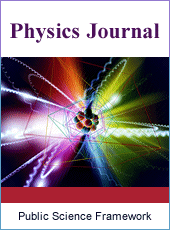Physics Journal
Articles Information
Physics Journal, Vol.5, No.1, Mar. 2019, Pub. Date: Apr. 26, 2019
Features of Spherical Detonation in Explosive Gas Environments
Pages: 1-7 Views: 2269 Downloads: 415
[01]
Myron Polatayko, Department of Physical Electronics, Kyiv National University, Kyiv, Ukraine.
In one of the previous works, using the theory of explosion and the laws of conservation of mass, momentum and energy, the author managed to solve the system of equations for the spherical detonation model. The possible existence of a stationary mode at the beginning of the transition of a blast wave to detonation was proved, and a new formula appeared that determines the speed of a spherical detonation wave in reacting gases. This served as a powerful incentive for further studies of the detonation process. The proposed article is a logical continuation of the previous works. The main attention in the article is drawn to the fact of instability of the normal spherical detonation and instability of the Chapman-Jouguet regime, when the radius of the wave front considerably exceeds the critical one. The author studies the reasons for the increase in the speed of a spherical detonation wave during its transition to plane wave at large distances from the center of the explosion. The possibility of transition of a normal spherical detonation to a more stable state, with a higher energy level, in the form of a flat stationary detonation is indicated. It is assumed that two stationary states exist, that is, two energy levels for the stationary detonation, which makes it possible to explain the phenomenon of pulsating detonation in gaseous media.
Normal Spherical Detonation, Unstable State, Eyring Formula, Wave Speed, Steady State, Energy Levels, Pulsating Detonation
[01]
Myron Polatayko (November 5th 2018). Determination of the Velocity of the Detonation Wave and the Conditions for the Appearance of Spherical Detonation during the Interaction of Hydrogen with Oxygen [Online First], Intech Open, DOI: 10.5772/intechopen.81792. Available from: https://www.intechopen.com/online-first/determination-of-the-velocity-of-the-detonation-wave-and-the-conditions-for-the-appearance-of-spheri
[02]
Polatayko, M. M. (2012). Determination of the velocity of a detonation wave in an explosive gas mixture. Ukrainian Journal of Physics, 57 (6): 606-611.
[03]
Polatayko, M. M. (2013). Conditions for the occurrence of spherical detonation in a hydrogen-oxygen mixture. Ukrainian Journal of Physics, 58 (10): 963-968.
[04]
Polatayko, M. M. (2014). The range of permissible values of temperature, Mach numbers and specific hydrogen content in a gas mixture of the possible existence of normal spherical detonation. Ukrainian Journal of Physics, 59 (10): 980-988.
[05]
Polatayko, M. M. Investigation of spherical detonation in gases: Digest of articles. Saarbrucken: LAP LAMBERT Academic Publishing; 2014. 70 p.
[06]
Mader, C. Numerical simulation of detonation. 1st ed. Berkeley: University of California; 1979. 485 p.
[07]
Fedorov, A., Tropin, D., Bedarev, I. (2010). Mathematical simulation of the suppression of the detonation of a hydrogen-oxygen mixture by inert particles. Physics of combustion and explosion, 46 (3): 103-115.
[08]
Orlenko, L., editor. Physics of the explosion. 3rd ed. Moscow: Physmatlit; 2004. Vol. 1. 832 p.
[09]
Orlenko L. Physics of Explosion and Impact: tutorial. Moscow: Physmatlit; 2006. 304 p.
[10]
Korobeinikov V. P. Problems in the Theory of Point Explosions in Gases. Providence, RI: American Mathematical Society; 1976. 317 p.
[11]
Fickett W. Introduction to Detonation Theory. Berkeley: University of California Press; 1985. 214 p.
[12]
Zel'dovich Ya. B, and Raizer Yu. P. Physics of Shock Waves and High-Temperature Hydrodynamic Phenomena. New York: Dover; 2002. 944 p.
[13]
Sysoev, N. N, Shugaev F. V. Shock waves in gases and condensed matter. Moscow: Moscow State University; 1987.133 p.
[14]
Chorniy, G. G. Gas dynamics. Moscow: Science; 1988. 424 p.
[15]
Matveev, A. N. Molecular Physics. Moscow: World Publishing company; 1985. 450 p.

ISSN Print: 2471-8483
ISSN Online: 2471-8491
Current Issue:
Vol. 7, Issue 1, March Submit a Manuscript Join Editorial Board Join Reviewer Team
ISSN Online: 2471-8491
Current Issue:
Vol. 7, Issue 1, March Submit a Manuscript Join Editorial Board Join Reviewer Team
| About This Journal |
| All Issues |
| Open Access |
| Indexing |
| Payment Information |
| Author Guidelines |
| Review Process |
| Publication Ethics |
| Editorial Board |
| Peer Reviewers |


